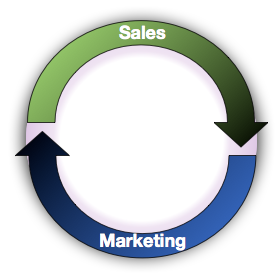By Christopher Rollyson  Silicon Valley Watcher offers up a useful riff on disruptive potential of Google+ – but it nonetheless has glaring holes and reflects arbitrary assumptions. I recommend reading it to learn about this argument, which is based on this questionable logic: “social data degrades the ‘quality’ of search results.” Silicon Valley Watcher offers up a useful riff on disruptive potential of Google+ – but it nonetheless has glaring holes and reflects arbitrary assumptions. I recommend reading it to learn about this argument, which is based on this questionable logic: “social data degrades the ‘quality’ of search results.”
The real answer is far less satisfying, “It depends.” Some search results will be improved with social data while others won’t. Search, SEO/SEM and other players dislike Google+ when it disrupts their businesses. Expect, and listen to, these arguments, but realize that they are often biased.
By Christopher Rollyson Redrawing Your Map: Selling in the Knowledge Economy explains how the 21st century and digital social networks are changing client behavior, and sales, forever.

Having started in business in the 1980s in Chicago, I have had a front row seat to the waning of the Industrial Economy, which has created unprecedented human wealth through fabrication, distribution and scale in countless iterations. Its meltdown sets the context for a profound shift in all businesses, and it holds the key to understanding the new ways to bring new business to your firm. The Industrial Economy practice that is known today as “selling” is on life support in the ICU, and it won’t survive in most areas of the economy. Here I’ll explain how profoundly things have shifted and how you can use this understanding to revitalize how you bring new business to your firm. I’ll close with how social business empowers this disruption. Continue reading Redrawing Your Map: Selling in the Knowledge Economy
By Christopher Rollyson Sam Fiorella, writing in The Social CMO, put together some fresh thinking on how to disrupt publishing, drawing some parallels with the music business in Open Letter to Media Publishers. Since their comments are turned off, I’ll offer some additional thoughts here.
Sam, thanks for one of the most intelligent posts I’ve read on the disruption of print I’ve seen in ages. Reading between the lines, I’ll offer this iteration.
Continue reading Ideas for Reinventing the Publishing Industry
By Christopher Rollyson  Thanks for being one of the first visitors to Social Business Services, which launched on 3 February 2012. The site has many moving parts, so please let us know by commenting on any page or post if something seems awry; we are still in the process of final tweaking and testing. Thanks for being one of the first visitors to Social Business Services, which launched on 3 February 2012. The site has many moving parts, so please let us know by commenting on any page or post if something seems awry; we are still in the process of final tweaking and testing.
Social Business Services aims to be your front row seat to the disruption and transformation of B2B sales and marketing as well as other functions like client/customer service, human resources, product development and IT. B2B clients will change your business because they are finding and educating each other very quickly. This creates fantastic opportunity for the firms that understand and react.
Thanks for visiting!
By Christopher Rollyson Customer Service Is the New Marketing shows how CMOs can leverage digital world of mouth by leading teams to serve people publicly.
 In most brand organizations, marketing investments rest on 20th century marketing principles whose results are diminishing every year. At the same time, an increasing portion of products and services are commoditizing, which puts more pressure on marketing to “create” differentiation and value. In many cases, there is no escape—except by changing the rules. Here I’ll show how marketing can reinvent itself by using social business to tap a hidden gold mine. In most brand organizations, marketing investments rest on 20th century marketing principles whose results are diminishing every year. At the same time, an increasing portion of products and services are commoditizing, which puts more pressure on marketing to “create” differentiation and value. In many cases, there is no escape—except by changing the rules. Here I’ll show how marketing can reinvent itself by using social business to tap a hidden gold mine.
The Threat: Dire Straits in Marketing
Marketing as a profession emerged in leading economies during the mid 20th century, when manufactured products were novelties in many categories. Marketers came to assume that they could “create an image” or “brand” using the mass communications to which few had access. Individual customers had no leverage because word of mouth was analog. Word of mouth has always been the most trusted source of product or service information, but it had no leverage until social peer-to-peer technologies emerged. Marketing’s credibility will never recover because customers now have a more trusted alternative, other customers. You can make this work for you. Continue reading Customer Service Is the New Marketing
By Christopher Rollyson Global social business strategy explains how robust stakeholder and workstream research created global opportunities for a global NGO.
 CSRA just completed a global study of social business in ten OECD language markets that may bode well for commercial and nonprofit organizations that are considering global audiences. We found that when you ground your social business strategy on rigorous research into the people you want to engage (stakeholders) and their specific online activities (workstreams), social business strategy can be applicable in several language markets simultaneously, leading to significant leverage and supporting global go-to-market initiatives. Having personally worked and lived in several language markets, I was surprised by the strong stakeholder/workstream patterns; I had assumed that the markets would differ from each other far more. Here I’ll offer my reflections on the research as well as recommendations for using social networks for global initiatives. CSRA just completed a global study of social business in ten OECD language markets that may bode well for commercial and nonprofit organizations that are considering global audiences. We found that when you ground your social business strategy on rigorous research into the people you want to engage (stakeholders) and their specific online activities (workstreams), social business strategy can be applicable in several language markets simultaneously, leading to significant leverage and supporting global go-to-market initiatives. Having personally worked and lived in several language markets, I was surprised by the strong stakeholder/workstream patterns; I had assumed that the markets would differ from each other far more. Here I’ll offer my reflections on the research as well as recommendations for using social networks for global initiatives.
Continue reading Global Social Business Strategy
By Christopher Rollyson 2012 B2B Marketing Social Business Opportunities presents rare career and business opportunities for B2B marketing pioneers

It happens every time. Executives in regulated and specialized B2B industries see disruptive technologies rise above the horizon, and they discard them out of hand because “that doesn’t apply to our business.” This attitude temporarily serves as a self-fulfilling prophesy, but it subsequently falls by the wayside.
Having been in the vanguard of ebusiness transformation during the late 1990s and early 2000s as both management consultant and marketing executive, I believe that 2012 will see serious adoption of social business by pioneering B2Bs.
In November 2012, I laid out the rationale in “2012 Will See B2B Early Adopters Move on Social Business,” so here I’ll describe this year’s specific opportunities for B2B marketers. Continue reading 2012 B2B Marketing Social Business Opportunities
By Christopher Rollyson  B2B Early Adopters Move on Social Business in 2012 predicts that 2012 will see significant movement toward social business among B2B pioneers. This prediction is based on CSRA’s recent research as well as my twenty-five years experience with guiding B2Bs’ adoption of disruptive technology. First, a critical mass of B2B executive leaders are familiar enough with social technologies to consider them for the first time. Second, the business driver will be the economy. During the past 4-5 years, enterprises have continue to cut costs wherever they could, but few are performing at the level they want to be. B2B marketing and sales are under more pressure to perform very efficiently than ever, and some leaders will enlist social business because they have tried everything else. Continue reading B2B Early Adopters Move on Social Business in 2012 B2B Early Adopters Move on Social Business in 2012 predicts that 2012 will see significant movement toward social business among B2B pioneers. This prediction is based on CSRA’s recent research as well as my twenty-five years experience with guiding B2Bs’ adoption of disruptive technology. First, a critical mass of B2B executive leaders are familiar enough with social technologies to consider them for the first time. Second, the business driver will be the economy. During the past 4-5 years, enterprises have continue to cut costs wherever they could, but few are performing at the level they want to be. B2B marketing and sales are under more pressure to perform very efficiently than ever, and some leaders will enlist social business because they have tried everything else. Continue reading B2B Early Adopters Move on Social Business in 2012
By Christopher Rollyson Evolving National-Global Recruiting and Sales with Social Business shows how firms can increase quality of recruits and sales leads while cutting costs.
 Social networks can help organizations, whether commercial, nonprofit or government, to significantly improve their efficiency in business processes like recruiting, sales and service. This is what we call “Enterprise Process Innovation” because, by using social networks to create and nurture relationships with alumni, your employees can diminish the time required to accomplish tasks within these processes. It’s well known that most alumni, former employees, move to firms that are related to your business (adjacent in the value chain) or complementary in some way. Yes, some move to competitors, but they are usually in the minority. Social networks, by significantly reducing the cost of having relevant, quality conversations, make robust employee-alumni networks actionable as never before. Continue reading Evolving National-Global Recruiting and Sales with Social Business Social networks can help organizations, whether commercial, nonprofit or government, to significantly improve their efficiency in business processes like recruiting, sales and service. This is what we call “Enterprise Process Innovation” because, by using social networks to create and nurture relationships with alumni, your employees can diminish the time required to accomplish tasks within these processes. It’s well known that most alumni, former employees, move to firms that are related to your business (adjacent in the value chain) or complementary in some way. Yes, some move to competitors, but they are usually in the minority. Social networks, by significantly reducing the cost of having relevant, quality conversations, make robust employee-alumni networks actionable as never before. Continue reading Evolving National-Global Recruiting and Sales with Social Business
By Christopher Rollyson Many employment or career-related discussions contain a feeling of gloom and doom, but I have noticed a paradoxical market development: that the unpredictable and volatile economy that affects all businesses and careers is actually driving more demand for expertise, but the demand doesn’t look the same to companies or workers. Here I’ll explain how this works, but even more important, I’ll give you some practical tips on using the market to your advantage (featuring social technologies).
|
|
 Silicon Valley Watcher offers up a useful riff on disruptive potential of Google+ – but it nonetheless has glaring holes and reflects arbitrary assumptions. I recommend reading it to learn about this argument, which is based on this questionable logic: “social data degrades the ‘quality’ of search results.”
Silicon Valley Watcher offers up a useful riff on disruptive potential of Google+ – but it nonetheless has glaring holes and reflects arbitrary assumptions. I recommend reading it to learn about this argument, which is based on this questionable logic: “social data degrades the ‘quality’ of search results.”





